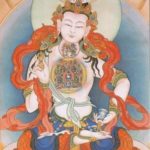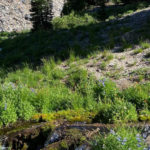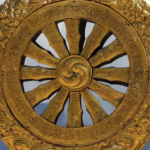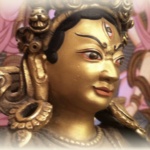Letter from Pema Khandro
“The spotless dharmakāya, luminous and clear,
Is the buddha nature of all beings,
Yet through their ignorance and clinging,
They wander in the cycle of existence.
In the wilderness of karma and defilement
They stray in weariness.
Today I will bring rest to their exhausted minds.”1
What if rivers, sky and ocean could wash away our suffering? What if our breath could liberate our minds? How can the body help us return to the basic sanity of what we already are? They are the questions that ring out from Dzogchen texts. They are profound questions about something so near and dear to us, our own suffering and the path to freedom from it. Moments of freedom from our own suffering really matter. Just to have relief for sometime. To lift the gaze and see the blue sky. To have a few days of being very calm in retreat or while sitting by a river.
I remember once sitting on a mountain top during a retreat, practicing the Separating Samsara and Nirvana practice and I noticed that how I was on that mountain top was different than how I was in my camper a few hours earlier. Something about the mountain, something about the space and that meditation opened me up further. Things felt more quiet and grand, simple and epic all at once. It was one of those moments we can have as human beings, with body as the sensitive instrument to interpret our world. Little moments like this are a good basis, like a food that nourishes us. But there is something that is difficult about remaining in them and finding them again. It is why we need training, and to take time out to practice. We need moments of freedom and moments of relief, but we also need the training necessary to be able to find that reliably – wherever we are, whatever is taking place. So that we can give that peace to ourselves as a medicine.
We do have a path forward from any moment of suffering, it is a way in and it is a way through at the same time. Dzogchen meditation often refers to body, speech and mind, the three gates, the three doors. This is how we practice meditation, it is a whole body affair. The body with all its horrors and beauties comes along. Emotion and speech in tow, not left behind. And mind engaged, compelled by our chosen object of focus. It takes some training on how to use the three doors, but we can gain confidence and find stability.
How often does it happen in our lives, where we synchronize the three doors in a state of settled peace, where the light of the three-fold awareness is on and focused in the same direction? Very rarely, despite it being such a relief. There is often a little part of us somewhere else and it could be that way for good reason. Sometimes where we are is very, very difficult. How things are can be overwhelming. Sometimes, absence is a coping mechanism because it is the best we can do. Being present is not so easy in a landscape of collective trauma, impending doom and bitter divides. Absence, denial, cutting off, tuning out, vegging out – it is understandable and even at times necessary. But there are better ways that relieve our suffering – more long-term solutions. It is something we attune deeply to in retreat – the wish to unravel our suffering at the root, doing the time, taking the actual time it takes to become an expert on our own state of being, to train well and find integrity with our own presence. It is good to find comfort and ease. It is why we retreat. To retreat is a pause from all our wandering to explore the basic energies that fuel our lives, to show up compassionately to what we are.
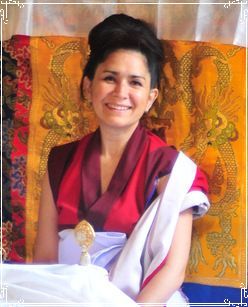
As we prepare for our annual Dzogchen retreat this weekend, I feel grateful to have this space to go deep together, to explore the wilderness of mind and the landscape body through these gentle, poetic and profound methods. Having survived the wildfires and the pandemic, it seems the most soothing and wonderful thing to do.
And particularly, to continue our annual retreat despite the obstacles of the last couple years, seems like a good omen, a spot of hope and optimism. Here is what we have planned:
-
We will open with the lineage supplication, mandala offering and other lovely opening prayers led by the community.
-
Every morning for three mornings, I will lead a study of Longchenpa’s Finding Comfort and Ease in the Nature of Mind as well as leading the semdzin, the holding onto the nature of mind practices.
-
In the afternoon, our group leaders will lead community tea time, restorative yoga and Heart Sutra chanting. There will be Tsa lung practices, the inner yogas.
-
Riwo Sangcho in the morning and short dream yoga in the evenings.
-
There will be an evening time for dialogue and Q&A with me.
-
One of my favorite parts of every retreat is the closing circle just before the end where we all talk.
-
We will end by dedicating the merit to our loved ones. There will be instructions for how to sign up to do this.
-
There are some parts of the retreat with cameras on and some with cameras off. We will let you know. Of course, you can always do what is best for you. This is not a caravan of despair and if you can come on camera, that is such a nice part of the retreat for all of us.
-
I will offer the private meetings following the retreat.
-
There is also an optional (but encouraged) fast from social media, with an optional conscious use of social media period in the evening time.
-
We encourage you to take a weekend of silence during the breaks from the retreat if it is appropriate for you, so that even though you are at home, you are still in an inwardly focused place and taking a rest.
For the retreat, please prepare a place to practice throughout that is as quiet and undisturbed as possible. It doesn’t have to be perfect, just the best you can do is fine. A closet, a tent in the backyard, be creative and find a good space. I suggest having a small shrine set up there with a picture of a buddha and a candle and/or incense if you can. We use a photo or painting of Samantabhadra in consort; this is the symbol of Dzogchen. You can use whatever you have that uplifts your mind, it helps meditation to have an inspiring space.
I send millions of White Tara mantras out to all those who have been affected by covid and the wildfires that were north and south of Dakini Mountain. May all these beings find relief, rest and ultimate peace.
I look forward to seeing you this weekend, our beloved friends, sangha and members.
My very best to you always,
1. Longchenpa. Finding Rest in the Nature of the Mind: Trilogy of Rest, Volume 1 . Shambhala. Kindle Edition.
DZOGCHEN RETREAT
September 17-19th, 10am – 6pm PT | 1pm – 9pm ET
This retreat focuses on the paradox of resting in buddha-nature and recognizing illusions. It offers support for exploring Buddhist philosophy experientially through alternating dharma study and practice.
The retreat is led by Buddhist scholar and teacher, Pema Khandro, founder of the Buddhist Studies Institute. As a special event during the pandemic, Pema Khandro will lead the study of and practice of the sems nyid ngal gso, Longchenpa’s instructions on Finding Comfort and Ease in the Nature of Mind, a classic text of the Nyingma lineage of Tibetan Buddhism. This retreat is led entirely online, with alternating sessions of group practice, small group discussions, yoga, meditation, lectures, question and answer sessions with Pema Khandro and private meetings at the end.
This is an OPEN retreat. Register to come to any or all of the retreat days.
About the Retreat…
Buddhist Philosophy
Pema Khandro teaches on The Mirror Illuminating the Heart, Dzogchen Nyingthig teachings on the vast view. These beautiful teachings consider the fundamental nature of mind and reality.
Group Meditation Classes
Pema Khandro teaches from the 27 Practices for training for Dzogchen meditation from the sems nyid ngal gso, Longchenpa’s instructions on Finding Comfort and Ease in the Nature of Mind.
Heart Sutra Chanting
Remember the profound teachings that unravel it all at the root. Afternoon Heart Sutra chanting will be led in English by Buddhist Studies Institute Faculty.
Dharma Conversations
Spiritual community is an important aspect of Buddhist practice, and it is even more important during the times of pandemic when in-person gatherings are limited. Join your fellow community members in dharma conversations during afternoon tea breaks (bring your own tea!). These are guided, small group conversations led by the teaching assistants.
Restorative Yoga
Unwind, let go of stress and give your body support. This simple, slow, bliss yoga class is designed to give rest and release to your body and mind. Each afternoon session will begin with an optional yoga class for you to do at home led by Buddhist Studies Institute Faculty.
Deep Practice
Unplug. Disconnect. Take space for inner silence and chanting meditation. Share silence together. Enjoy deep dharma study. This retreat includes guidance and support for taking a break from social media and news to create space for reflection and to declutter the mind. There is an optional one hour social media period suggested each day for those who want to reduce but need to stay plugged in.
Pre-requisites
This retreat does not cover the restricted practices of Dzogchen but it does cover the preliminary practices. Previous meditation experience and a history of meditation practice is necessary to fully appreciate and engage in the practices taught in this retreat. One should be comfortable doing extended meditation periods.
UPCOMING EVENTS
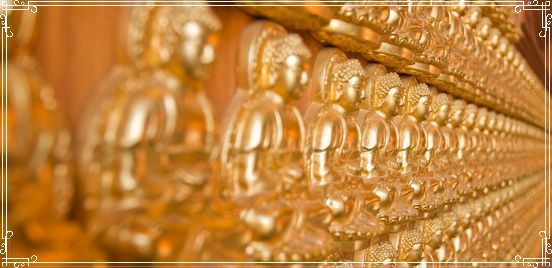
Daily & Weekly Programs
- Daily Meditation, Free Every Day at 12 PT / 3pm ET
- Vajrayana Training, Ngakpa Training, Open Teaching, and Umdze Training (Except during retreats and training or other special events) – Wednesday nights 6pm PT / 9pm ET
September
- Sept 17-19th Annual Dzogchen Retreat with Pema Khandro
- Sept 28-30th Ngondro Module 4 – Intrinsic Wisdom
October
- Oct 16th, Vajra Sangha Retreat with Pema Khandro – Details TBA
- Oct 30-Feb 26, 2022, Meditation Instructor Training
As more details roll out for our Upcoming Events, please visit the Event List Here.
